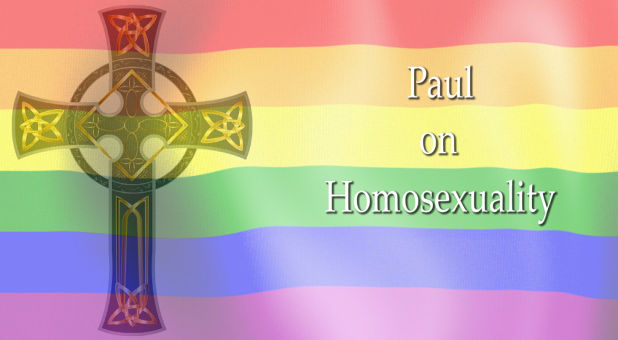The Apostle Paul and Homosexuality—Answering Homosexual Objections (Part 2)
Objection # 2: Paul is only referring to homosexual acts when they occur within the idolatrous context of a pagan temple (same-sex male shrine prostitution).
This is one of the most commonly argued objections by numerous progressive, “gay”-affirming theologians (i.e.: Dale Martin, Letha Scanzoni, Virginia Ramey Mollenkott, Troy Perry). Since verse 23 describes people who have “exchanged the glory of the immortal God for images resembling mortal man and birds and animals and creeping things,” pro-“gay” advocates claim that verses 26-27 apply only to homosexual idolatrous behavior. However, Paul is not simply referring to homosexual conduct within the context of male shrine prostitution, but rather the sins of the entire human race when it abandons God. This fact becomes unmistakably clear when he continues with a litany of additional vices – “unrighteousness, evil, covetousness, malice … envy, murder, strife, deceit, maliciousness … gossips, slanderers, haters of God, insolent, haughty, boastful, inventors of evil, disobedient to parents, foolish, faithless, heartless, ruthless” (vss. 29-31). Are any of the above listed items only sinful when practiced in the context of idolatry? Like homosexuality, they are symptomatic of our fallen state and are fundamentally immoral under any circumstance. As Thomas Schmidt in his book Straight and Narrow? insists, “Paul is not suggesting that a person worships an idol and decides therefore to engage in same-sex relations. Rather, he is suggesting that the general rebellion created the environment for the specific rebellion.” In other words, the initial sin of abandoning God inevitably leads to a precipitous moral decline, characterized by all types of moral corruption and reprehensible conduct.
Furthermore as Dr. Michael Brown explains, “There is an idolatry that many ‘gay Christians’ engage in, and in a sense, it is the ultimate idolatry, the idolatry of self, and it goes like this: ‘I have wrestled with what the Bible says about homosexual practice, and I’m not 100 percent sure what to make of it. But I am 100 percent sure that I’m gay—that’s who I am to the core of my being—and therefore I will interpret the Word through the lens of me—through the lens of who I am.’ Yes, this too is idolatry, putting ourselves and our desire and our needs in the place of God, interpreting the Word based on who we are rather than interpreting who we are based on the Word. This is a surefire path to deception.” This perilous, interpretive approach to Scripture is easily detected whenever homosexuals rationalize their lifestyle on the basis of it being “natural to me,” and therefore not subject to Paul’s admonition regarding unnatural relations. It’s another tragic example of a theological bias driving the hermeneutical process.
Dr. Gagnon similarly states, “All sins constitute a rebellion against God and an ‘idolatry’ in the looser sense of supplanting God’s intent for one’s own.” So, no matter how one looks at it, Paul strongly condemns all conduct, including any type of homosexuality, which involves the rejection of divine design or purpose.
Objection # 3: This passage condemns only exploitative, pederastic (pedophilia) forms of homosexuality.
In her book The New Testament and Homosexuality, Robin Scroggs argues as a strong proponent of this viewpoint. However, there is categorically no evidence to make such a baseless claim. If the apostle Paul had intended to solely condemn adult-child sex, there were more precise Greek words to indicate boys or children. Dr. Gagnon writes as well that “had Paul intended to single out pederasts he could have used the technical term paiderastēs.” The use of the carefully chosen phrase “for one another” (eis allēlous) (vs. 27) when referring to homosexual passions is likewise indicative of the reciprocal, non-exploitative character of the relationship.
From a pro-homosexual perspective, Bernadette Brooten has criticized both John Boswell and Robin Scroggs for their erroneous use of the exploitation argument, “If … the dehumanizing aspects of pederasty motivated Paul to condemn sexual relations between males, then why did he condemn relations between females in the same sentence? … Romans 1:27, like Leviticus 18:22 and 20:13, condemns all males in male-male relationships regardless of age, making it unlikely that lack of mutuality or concern for the passive boy were Paul’s central concerns … The ancient sources, which rarely speak of sexual relations between women and girls, undermine Robin Scroggs’s theory that Paul opposed homosexuality as pederasty.”
Since the predominant expression of pederasty in the Greco-Roman world involved an adult male with an adolescent boy, Dr. Gagnon confirms how “the reference to lesbianism in 1:26 casts a wider net than abusive, male, pederastic relationships, in as much as lesbianism in the ancient Mediterranean world was not confined to pederastic models or rigid active verse passive roles. The fact that Paul segues from lesbianism in 1:26 to male homosexual behavior in 1:27 with the words ‘and likewise also’ (homoiōs te kai) suggests that he rejects both forms of homosexual behavior for the same reasons; that is, on grounds other than their exploitative or oppressive character.”














































